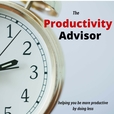
Summary: <br> Multitasking<br> <br> Do you want to be more productive without working longer or harder? <br> Do you find it difficult to work on the things that are important to you? <br> Are you trying to squeeze more into each day and feeling burned out? <br> <br> It’s not surprising that we often feel overwhelmed and under pressure. <br> <br> Research shows that the average worker spends 28% of their time dealing with emails and the average working day now extends from 7am – 7pm as technology means we are always connected.The average smartphone user spends 58 minutes a day checking their phone and they are never more than 3’ away from it. We’re probably closer to our smartphones than we are to our partners/loved ones. <br> <br> Do you recognise some of yourself in the stats above? I’m sure we all do but that doesn’tmake them less scary does it? Add to that time for commuting and meetings and it’s easy tosee how our work week can easily rush by without us feeling we have achieved the thingswe want to. <br> <br> One of the answers to having not enough time might seem to do more things simultaneously – multitasking. Lots of people are proud of their multitasking ability and of course we all know that women are better at this than men! The only problem is that multitasking is a very inefficient way to work. It feels good because we trigger the happy signals in our brain. We feel busy, important and in demand which can all help boost our sense of self. <br> <br> However, multitasking is exhausting both mentally and physically. Not only does it require huge amounts of brain energy it also requires time to “switch” between tasks. This switching time is less in women, than in men – giving rise to the women are better at multitasking thing. However, losing time as we switch between tasks isn’t an efficient way of working. Just think of a factory with a production line flowing effectively. It wouldn’t be efficient to stop it and change what was being produced every few minutes,yet that’s what we expect our brains to do when multitasking. No wonder we often make mistakes and end up feeling drained and exhausted. <br> <br> Not convinced doing lots of things and being always available is a problem? Well some research by the University of London showed that this type of information overload “infomania”as they describe it can cause an effect on your IQ similar to smoking marijuana,which I’m sure you would agree isn’t the most productive state to be in.<br> <br> <br> <br> <br>
